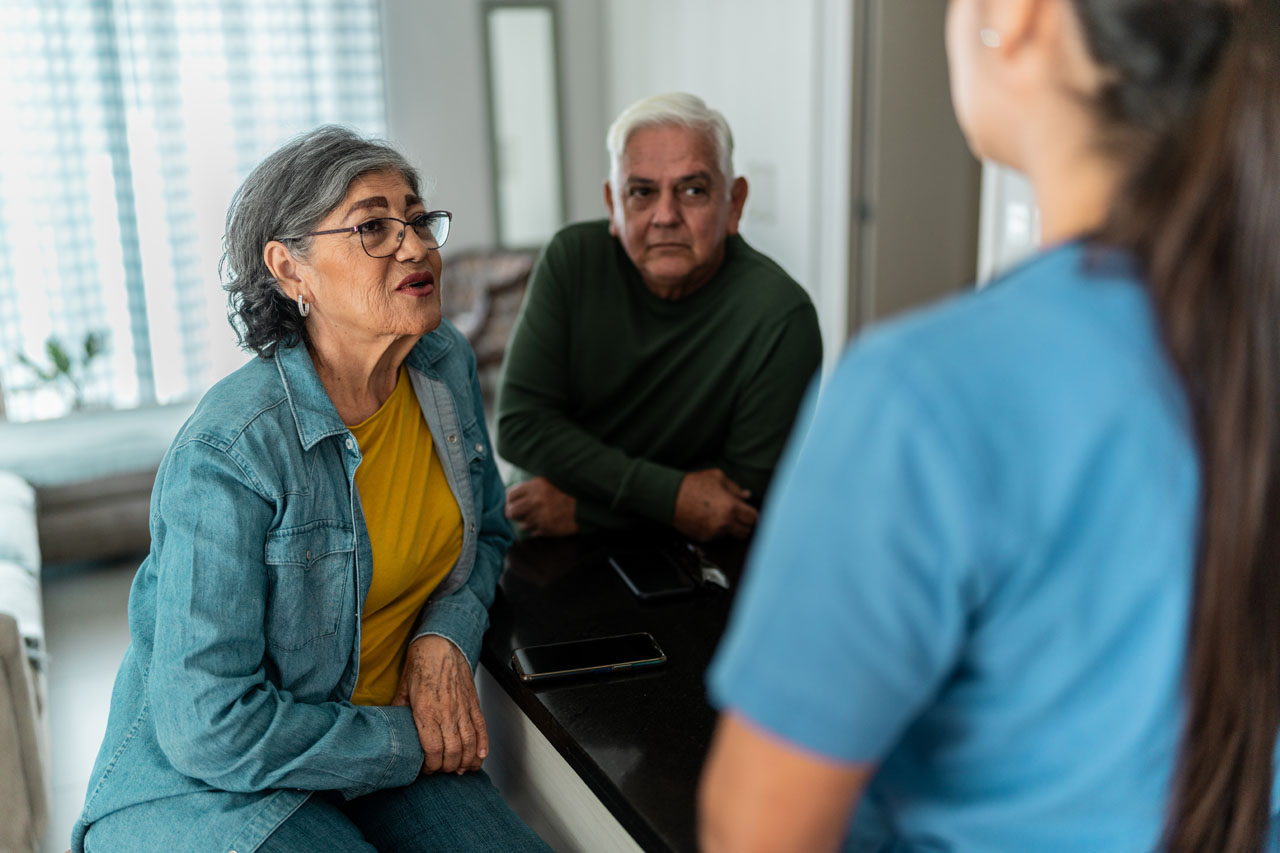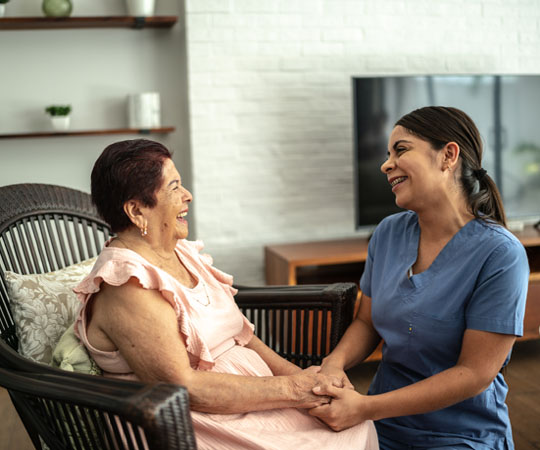Why Are Home Health Companions in Miami Gaining Popularity? The Role of Companionship in Care
The need for top-notch home health care keeps growing as more older adults, people with disabilities, and those with chronic conditions want to stay independent. If you’re feeling anxious about a parent, spouse, or dear friend who needs medical help but loves the comfort of home, you’re not alone—home health care is becoming a favorite for families seeking personalized, professional care in a familiar place. Beyond the medical and physical help, there’s something just as critical—maybe even more so—for their well-being: companionship. If you’re exploring home health companions in Miami, this article explains why it matters and how it can transform your loved one’s life.
What is Companionship in Home Health Care?
Companionship in home health care means having a caregiver who does more than medical tasks or daily chores—they offer emotional support, social connection, and true friendship. These caregivers, often nurses, build personal bonds that address your loved one’s mental and emotional needs. It could be chatting over coffee, enjoying a game, or simply listening when they need to talk. For a child worried about a lonely parent or a spouse caring for a partner, this human touch can ease your concerns about their isolation.
How Companionship Improves Health and Happiness
If your loved one spends too much time alone—whether due to health struggles, mobility issues, or where they live—companionship can make a world of difference. Here’s how it tackles the problems you’re likely worried about:
1. Mental and Emotional Health
You’ve probably noticed your parent or spouse feeling lonely or disconnected. Studies show long-term isolation can lead to depression, anxiety, and even memory loss, especially in seniors. Companionship steps in with regular interaction and support, helping them feel valued and heard. That human link can lift their spirits in ways medical care alone can’t.
2. Reduced Feelings of Loneliness
Loneliness isn’t just a mood—it’s linked to serious health risks like high blood pressure, weaker immunity, and chronic diseases. A caregiver who offers companionship gives your loved one purpose and someone to share their day with. Those daily conversations can turn worry into relief for you, knowing they’re not facing life alone.
3. Cognitive Stimulation
Keeping their mind active is a big concern if dementia or memory issues are on your radar. Talking, playing games, reading together, or chatting about the news stimulates their brain. For early cognitive decline, this can slow the process, giving you peace of mind that their mental sharpness is supported.
4. Physical Health Benefits
You want them healthy, not just emotionally but physically too. Companionship boosts mental well-being, which often leads to better physical habits—they’re more likely to stay active, take meds on time, and eat well. A caregiver might encourage walking or stretching, keeping them mobile and reducing your stress about their physical decline.
5. Improved Recovery Outcomes
If they’re recovering from surgery, an injury, or illness, companionship can speed things up. Research shows people with strong social support heal faster and face fewer setbacks. That positive boost reduces stress and strengthens immunity—meaning fewer late-night worries for you about their progress.
The Psychological Impact of Loneliness on Health
Loneliness is a public health crisis, especially for older adults living solo or with chronic conditions—something you might be seeing firsthand. Studies highlight its dangers:
Increased Risk of Depression:
Isolation breeds sadness, particularly in seniors, leaving them feeling lost without connection.
Cognitive Decline:
Loneliness raises dementia risks; mental engagement is key to slowing that down.
Chronic Health Conditions:
Heart disease, stroke, and hypertension hit harder when someone’s lonely, fueled by emotional stress.
Companionship in home health care fights back, offering a lifeline to keep them healthier and more stable—exactly what you’re hoping for.
The Importance of Emotional Connection in Home Health Care
Emotional support is a game-changer, especially if your loved one feels cut off from friends or family. A caregiver who spends time with them builds trust and comfort, easing their stress—and yours. For someone with a chronic illness or disability, this emotional bond brings positivity and normalcy to overwhelming days. Sharing joys and struggles with a companion can renew their purpose, giving you confidence they’re not just surviving but living.
How Companionship Improves Quality of Life for Seniors
For an aging parent or spouse, companionship isn’t optional—it’s essential. Health limitations or losing loved ones can leave them isolated, a concern that keeps you up at night. In home health care, it creates a caring space where they can enjoy their later years. Here’s what it delivers:
A Sense of Belonging:
Talking about their day with someone fosters connection and respect.
Mental Engagement:
Conversations and activities keep their mind sharp, easing your dementia worries.
Enhanced Physical Activity:
Light exercise with a caregiver boosts health and energy.
Emotional Comfort:
Support for sadness or health fears makes their days brighter.
The Role of Companionship in Palliative Care
Palliative care, which eases symptoms and stress from serious illness, leans heavily on companionship. If your loved one faces a life-limiting condition, they’re likely wrestling with fear and loneliness. A caregiver’s presence offers:
Emotional Support:
A safe space to voice worries and sadness.
Dignity and Respect:
Care that honors their wishes.
Relief from Isolation:
A human connection when they can’t leave home.
This comfort is vital, giving you reassurance they’re not alone in their struggle.
The Importance of Companionship in Holistic Care
Companionship is increasingly central to home health care because it treats the whole person—emotional, social, physical, and mental needs—not just the illness. This holistic approach delivers complete care, improving their health and daily experience. A caregiver who balances mental and physical support creates a safe, uplifting space—something families notice when choosing a home health companion.
Why Choose Home Healthy Over Others?
You’re researching options because you want the best for your loved one. People turn to Home Healthy over others for our focus on companionship alongside top-notch medical care. We train our caregivers to build real relationships, not just check boxes, ensuring your parent or spouse feels seen and supported. Our holistic approach means we’re not just another agency—we’re a partner in their well-being. Visit homehealthy.com to learn more or connect with us; we’re here to answer your concerns and tailor care to what they need most.
Ready to Ease Your Worries?
Home health care is about more than medicine—it’s about keeping your loved one happy and connected. If loneliness, recovery, or quality of life are on your mind, companionship can be the answer.
Check out homehealthy.com to explore how our home health companions in Miami can bring relief to both them and you—because they deserve care that feels like family.
Why Are Home Health Companions in Miami Surging in Demand? The Power of Companionship in Care
As Miami’s population of seniors, individuals with disabilities, and those managing chronic illnesses grows, so does the demand for exceptional home health care. If you’re concerned about a loved one—perhaps a parent, spouse, or close friend—who needs support yet cherishes the comfort of home, you’re part of a rising trend. Families across Miami are turning to home health companions for tailored, professional care delivered in a familiar setting. While medical assistance is vital, there’s an often-overlooked element that can be even more transformative: companionship. This article dives into why home health companions are booming in Miami and how their personal connection can enrich your loved one’s life.
What Does Companionship Mean in Home Health Care?
Companionship goes beyond helping with chores or medical needs—it’s about building a genuine relationship. A home health companion in Miami might be a trained caregiver or nurse who offers emotional warmth, social interaction, and a listening ear. Whether it’s sharing stories over a cup of coffee, playing a card game, or simply being present, this bond meets your loved one’s deeper needs. For anyone worried about a family member feeling isolated, this personal touch brings comfort and reassurance.
How Companionship Boosts Health and Well-Being
If your loved one is spending too much time alone—perhaps due to mobility challenges, health issues, or Miami’s sprawling layout—companionship can be a game-changer. Here’s how it addresses the concerns keeping you up at night:
1. Mental and Emotional Lift
Loneliness can weigh heavily on anyone, and you may have seen it in your loved one’s quieter moments. Research links prolonged isolation to depression, anxiety, and cognitive decline, especially among seniors. Regular chats and support from a companion can brighten their mood and restore a sense of worth—something medicine alone can’t achieve.
2. Easing Loneliness
Far more than a fleeting feeling, loneliness raises risks like heart disease and weakened immunity. A companion provides daily connection, giving your loved one someone to laugh with or confide in. Knowing they’re not facing each day solo can lighten your worries too.
3. Sharpening the Mind
If memory loss or dementia is a fear, keeping their brain engaged is crucial. Activities like discussing the news, solving puzzles, or reminiscing stimulate cognition, potentially slowing decline and offering you peace of mind.
4. Supporting Physical Health
A happier mind often leads to a healthier body. Companions encourage habits like taking medications, eating balanced meals, or even strolling through a Miami park. This can keep them stronger longer, easing your stress about their physical well-being.
5. Speeding Recovery
Recovering from illness or surgery? Studies show social support accelerates healing and reduces complications. A companion’s uplifting presence can bolster immunity and resilience, meaning fewer anxious calls for you to make.
Loneliness: A Hidden Health Threat
Loneliness isn’t just an emotion—it’s a health epidemic, hitting seniors and those with chronic conditions hardest. In Miami, where vibrant communities contrast with isolated pockets, the stakes are high:
Depression Risk:
Isolation fuels sadness, leaving many feeling adrift.
Cognitive Impact:
Lack of stimulation heightens dementia odds.
Physical Toll:
Stress from loneliness worsens conditions like hypertension or stroke.
Companionship counters these threats, offering a lifeline that keeps your loved one steadier and healthier.
Why Emotional Bonds Matter in Care
For someone cut off from friends or family—common in Miami’s fast-paced urban sprawl—an emotional connection can be transformative. A caregiver who builds trust brings calm and positivity, especially for those with chronic illnesses or disabilities. Sharing moments of joy or struggle reignites their sense of purpose, reassuring you they’re truly cared for.
Elevating Senior Life Through Companionship
For aging loved ones, companionship isn’t a luxury—it’s a necessity. Miami’s seniors often face isolation after losing peers or grappling with health limits. A home health companion creates a nurturing environment where they can thrive, delivering:
Connection: Daily talks foster belonging and dignity.
Mental Spark: Engaging activities keep their minds active.
Physical Boost: Gentle encouragement for movement enhances vitality.
Emotional Relief: A shoulder to lean on lightens tough days.
Companionship’s Role in Palliative Care
In palliative care, where easing symptoms and stress is paramount, companionship shines. For a loved one with a serious illness, a caregiver offers:
Comfort: A safe space to express fears.
Dignity: Respectful care aligned with their wishes.
Presence: A steady hand to combat isolation.
This support ensures they’re not alone, giving you solace in a challenging time.
The Holistic Edge of Companionship
In Miami’s home health scene, companionship is a cornerstone of holistic care—addressing emotional, social, and physical needs together. This whole-person approach doesn’t just treat symptoms; it enhances life. A caregiver blending medical skill with personal rapport creates a sanctuary of well-being—something families notice when choosing care.
Why Home Healthy Stands Out
When searching for care in Miami, you want excellence. Home Healthy excels by pairing top-tier medical support with heartfelt companionship. Our caregivers are trained to forge real relationships, ensuring your loved one feels valued—not just tended to. This holistic focus sets us apart as a true partner in their health. Explore more at homehealthy.com or reach out—we’re ready to customize care that fits their needs and eases your mind.
Ready to Bring Comfort Home?
Home health care is about more than treatment—it’s about joy and connection. If you’re wrestling with concerns about loneliness, recovery, or quality of life, a Miami home health companion could be the solution.
Visit homehealthy.com to see how we can support your loved one with care that feels like family—because they deserve nothing less.




